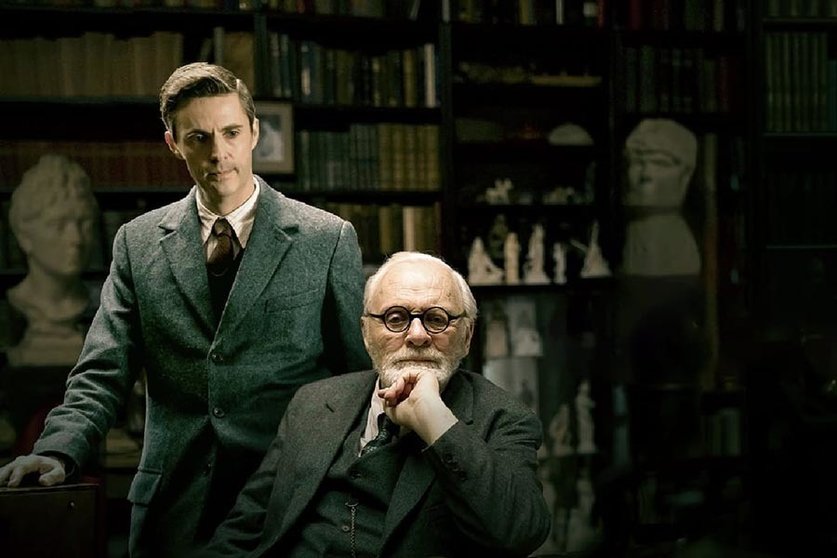The existence of God and the failure of scientism to guide human life
Movie. «Freud's last session»

The Enlightenment promise to enlighten humanity only with the lights of scientific reason, possessor of truth and capable of providing happiness and autonomy, in perpetuity, in a world without God, has failed. The great questions about the meaning of existence, dismissed as irrelevant, continue to hunger for knowledge accompanied by wisdom. In the film “Freud’s Last Session”, two brilliant minds of the 20th century, the writer C.S. Lewis and the father of psychoanalysis, Sigmund Freud, delve into the mysteries of human life and offer an example of how important issues can be debated from radically different positions without the disagreement being offensive.
On the eve of World War II, Sigmund Freud (Anthony Hopkins), exiled by Nazism in England and close to death from oral cancer, invites the iconic writer C.S. Lewis (Matthew Goode) — considered the “apostle” of skeptics — into a long philosophical conversation about the existence of God, the insufficiency of scientific reason to guide human life, the meaning of suffering, love, sexuality and mystery of death. The British filmmaker, Matt Brown, recreates in his film Freud’s Last Session a fictional dialectical duel between two of the most important figures of the 20th century. It seems that Freud’s authentic agenda included, a few days before his death, a meeting with a young Oxford professor, but at no time was it proven that it was C.S. Lewis and there is no evidence that a personal relationship existed between them.
The director who inspired his film in the work The Question of God [1] Armand Nicholi puts the focus of this plot on the difference in the beliefs of both. But, also in two famous lives that were not perfect nor did they follow easy paths, but were marked from childhood by family losses and suffering.
The author of the psychoanalytic theory that revolutionized studies on the human mind and the impossibility of knowing ourselves completely due to the existence of the subconscious, boasted of being an atheist. In his childhood, he suffered continuous punishment from his father and, in his adulthood, he lost a daughter and his five-year-old granddaughter to the flu. For his part, Clive Staples Lewis, known as C.S. Lewis and author of The Chronicles of Narnia, moved away from Christianity after the death of his mother, and converted again after reading Phantastes, by George Mac Donald, The Eternal Man, by G. K. Chesterton, and, especially, the Gospels. I never had the experience of seeking God. “He was the hunter, and I was the deer,” says Lewis in one of the most beautiful scenes in the film. After his new spiritual awakening, the writer publishes The Return of the Pilgrim, a satire of contemporary philosophy that marks the beginning of this imaginary encounter in cinematic fiction.
 The wish that God did not exist
The wish that God did not exist
In the film, the two characters maintain radical differences in the vision of the world that each one possesses. Precisely, these opposing positions serve the filmmaker to explore the thoughts that made them famous, while delving into personal aspects of their lives.
The dialogue overflows with depth and intelligence and the war context enriches it by opening it to questions such as the self-destructive condition of man, the role of Hitler, and responsibility for suffering, which serve to introduce an extensive conversation about God and scientific reason. Freud defends his well-known thesis that religion is an obsessive neurosis of humanity that threatens the freedom, truth and happiness of adult beings. He maintains that belief in God is incompatible with scientific reason and questions his existence in inaction in the face of human suffering. “Are these God’s wonderful plans?” he asks Lewis, as the radio broadcasts news about the imminence of a second Great War. His Creator of him does not exist. “I believe in science and the authority of reason,” he says.
For his part, C.S. Lewis disfigures Freud’s contradiction in that he proclaims himself an atheist, while the bookshelves and the consulting table are full of deities. Those of us who believe in God are not stupid, childish or neurotic […] The desire that God does not exist does not have to be more powerful than faith […] Why does religion open itself to science and yet “Is this not open to faith?” The professor argues that, without the gift of free will, humanity would be “a masked ball” and links suffering with selfish choices in the use of our freedom. Lewis manages to corner the legendary psychoanalyst with abundant facts about the failure of a scientific reason that has not fulfilled its promise of providing happiness and autonomy in a world without God. On the contrary, the great vital questions, labeled as unscientific and irrelevant, continue to hunger for knowledge accompanied by wisdom.
In any case, the discussion about God refers to the current debate on the insufficiencies of secularization to address human complexity, mystery and the spiritual dimension in the face of the materialist and biologically reduction of the rhetoric of progress linked to techno-scientific advances. Removing God from the human equation has not only not made humanity happier, but has led to postmodern idolatrizes that elevate having over being. “Only a fool confuses value and price,” said Machado. Thus, only foolishness can make us believe that carrying a cutting-edge mobile phone in our pocket quenches the hunger for meaning.
As María Zambrano states: “beliefs without creed, unassisted faith and wandering hope” transform us, we are “wandering beings without asylum because we thirst for reality, but also for transcendence.”[2]
Reasoning and dialogue is not offensive
On the other hand, the film is also surprising for the way in which the characters conduct their conversation, despite defending antagonistic theses. In fiction, Freud and C.S. Lewis offer an example of how important issues can be debated with arguments and without resorting to ad hominem disqualifications.
Javier Marías, in a brilliant article published a few years ago with the title “When reasoning is offensive” [3] referred to “absorbed localities” and “listening like someone who hears it rain”, alluding to the progressive insignificance of speaking and hear. The most vulgar emotionality and insults have abolished dialogue, an instrument that humanity has used to become aware of its own ignorance, motivate us to think for ourselves and recognize the other. How we communicate transforms relationships and society when its mission is twisted, serves deception and becomes mere chatter. The friendly tone in the film is a plea by the director to extol the virtues of dialogue in the face of manipulation and barbarity. He returns to Zambrano: “while men do not understand each other about what they seek and hope for, they do not understand themselves either.”
Amparo Aygües – Master’s Degree in Bioethics from the Catholic University of Valencia – Member of the Bioethics Observatory – Catholic University of Valencia
[1] Nicholi, A. (2004). The question of God: C.S. Lewis vs. S. Freud. Spanish version. Rialp.
[2] Zambrano, M. (2004). Towards a knowledge about the soul. Alliance.
[3] Marías, J. (2021). When reasoning is offensive. El País Newspaper. https://elpais.com/eps/2021-12-19/when-reazonar-resulta-ofensivo.html
Related

Emilio Girón: Stubbornness and Tinto de Verano
Exaudi Staff
30 March, 2025
5 min

Facing Divorce as a Christian Couple
Laetare
28 March, 2025
2 min

Mars Colonization: Technological Progress or Threat to Human Dignity?
Observatorio de Bioética UCV
28 March, 2025
9 min

The Good Smell of Coffee
Edistio Cámere
27 March, 2025
3 min
 (EN)
(EN)
 (ES)
(ES)
 (IT)
(IT)

